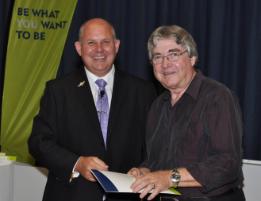Ron reminisces about campus life as beanbags come full cycle
Published on 21 November, 2012
When Ron Wallis arrived on campus in 1977, he was given a manual typewriter for routine 'office work' and a bottle of ink with nibbed pens to ensure a personal feeling for letters.
There was only one computer for the whole institution and staff and students had to make bookings to share the only photocopier.

Ron Wallis accepts his 35-year service award from VC Professor Scott Bowman
Some things remain the same though as vibrantly coloured beanbags were all the rage back in the 1970s, and they have made a comeback in the refurbished campus library.
Ron was initially employed as a student counsellor at CQUniversity's predecessor institution - the Capricornia Institute of Advanced Education - with responsibility for personal counselling, study skills counselling and vocational counselling.
Nowadays he's a specialised careers counsellor and was recently recognised as one of three foundation members of the National Association of Graduate Careers Advisory Services (NAGCAS).
Since starting out with the 'Institute', Ron experienced the transitions to the University College of Central Queensland, the University of Central Queensland, and Central Queensland University, which occurred over the past two decades.
CQUniversity is currently celebrating 20 years of being a fully-fledged University.
Ron recalls that, despite humble beginnings, technology did soon take hold on campus and the Ministerial announcement of CQU's new name (in 1994) was videoconferenced from Brisbane to Rockhampton via the then ground-breaking Interactive Systemwide Learning (ISL) system. In fact, CQUniversity is still a leader in the use of videoconference as well as online and digital technologies for education.
"While students tend to have the same types of issues over time, campus life has certainly changed," he says.
"Before the 1980s brought us the 'recession we had to have' education was experienced 'just for the sake of education' as graduates knew they could just walk into a job in a bouyant employment market. Consequently, campus life was more social and relaxed.
"Nowadays, students have to be much more career focused and discerning and they tend to be juggling work and study. There's many more mature-age students and women coming into study after having families. Students are more pragmatic since they are paying fees to attend."
Ron recalls that a symptom of campus-based socialising in the early days was the occasional need to take a utility around campus after big parties, offering lifts home to students incapable of walking.
"CQUniversity has always prided itself on the level of support available to students and it's still a frontrunner in offering prospective students access to careers counselling services. This greater level of service often convinces them to enrol with us," he says.
Careers and Employment Service staff are members of the National Association of Graduate Careers Advisory Services (NAGCAS). They are also associated with the Career Industry Council of Australia (CICA) and contributors to the Australian Journal of Career Development, plus Career Development Research Australia.
All Australian-accredited career practitioners adhere to the Professional Standards for Australian Career Development Practitioners, administered by CICA. Career practitioners operating within the higher education sector draw their 'key attitudes' from assumptions established in a handbook established by UNESCO (the United Nations Educational, Scientific and Cultural Organisation).
Among these assumptions is that opportunities and choices should be available for all people, regardless of gender, socio-economic class, religion, sexual orientation, age or cultural background.
Back in 1997, Ron participated in the initial UNESCO survey via NAGCAS. The UNESCO handbook was based on results from this survey.

